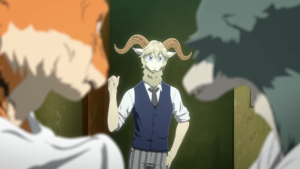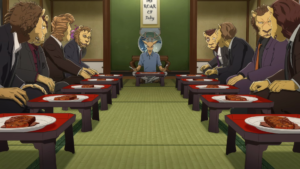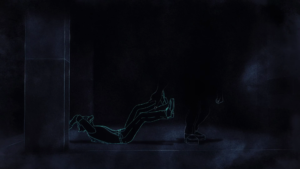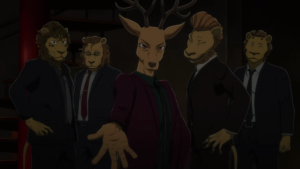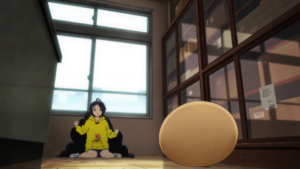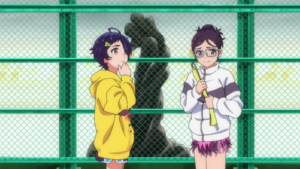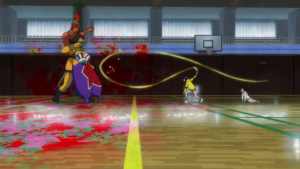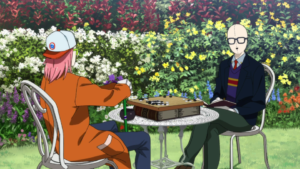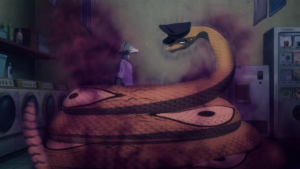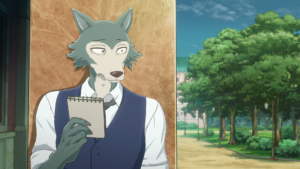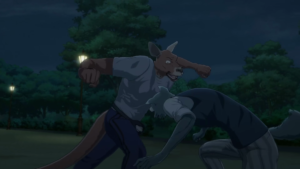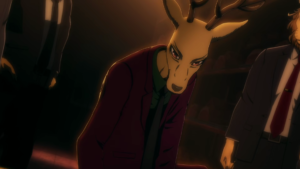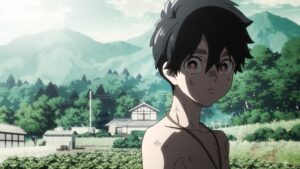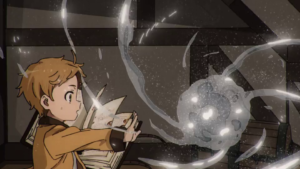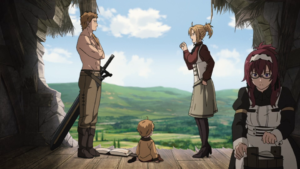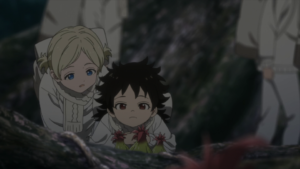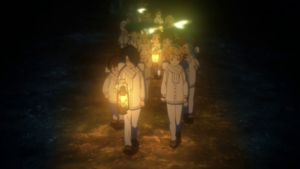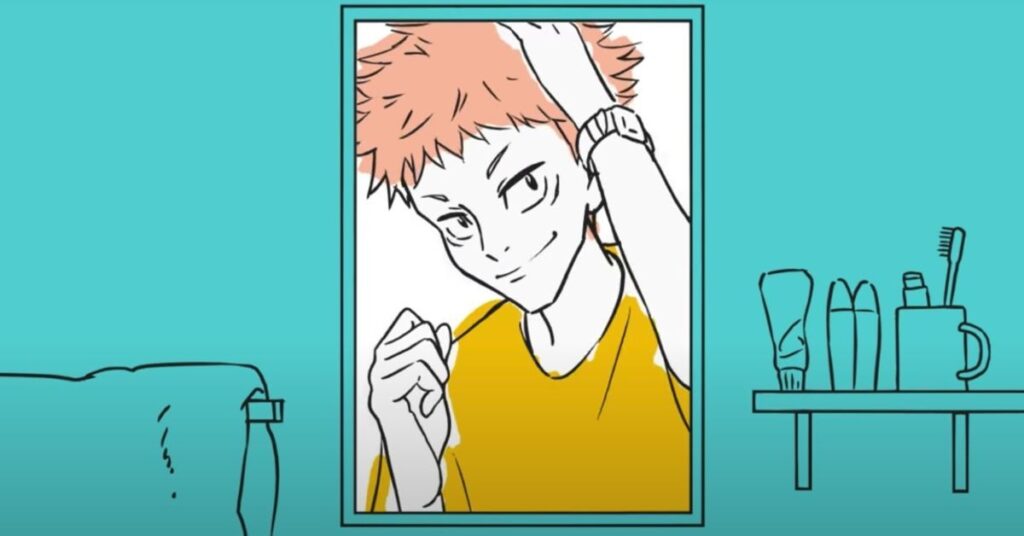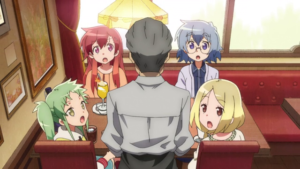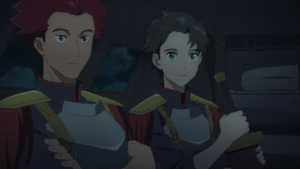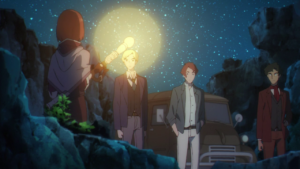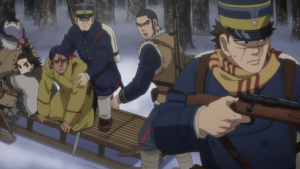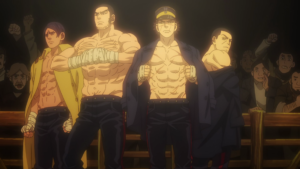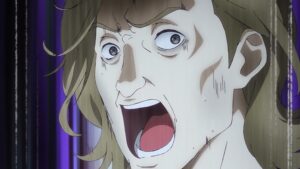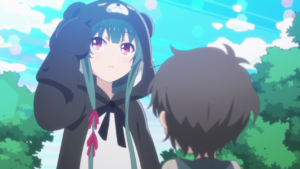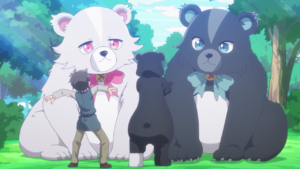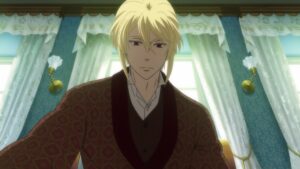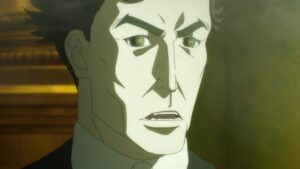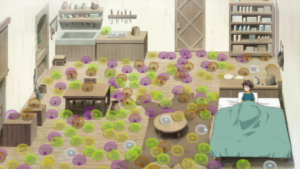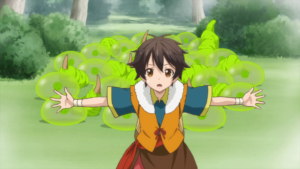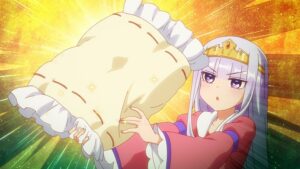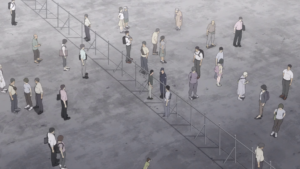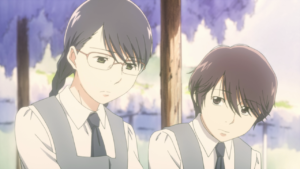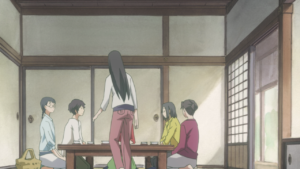The Promised Neverland S2
Short Synopsis: The recently-escaped orphans wander the forest, encountering both enemies and allies.
Lenlo: So let’s cut right to the chase, if you liked Season 1 you will probably like Season 2. You already know what Promised Neverland has to bring and this is more of the same. I thought it was alright but that it flubbed a bit on the presentation. I’m also sure you have heard that the manga goes down hill, I myself have mentioned it here before, but it doesn’t get bad. Not yet at least. It’s true that the first arc is the best arc and so I wouldn’t expect anything more than that but we have a ways to go before the series properly shits the bed. At least… 2-3 more arcs based on how you count, and in there we will meet my favorite character too!
As for the episode, it wasn’t bad. I continue to like the power dynamics of Promised Neverland. Our characters are never ahead, they never have the advantage and they will never win a proper physical confrontation. It gives every scene, even in such an idyllic forest, a fair amount of tension. Even when they were saved at the end of this episode we can’t help but wonder, are they really saved? Or is this just a new fire? The only negative thing I really have to say is that the lighting was often terrible. Dark scenes at night are hard, I know, but it was difficult to see anything during a lot of the chase scenes. The CGI spider demon thing in particular stood out as uh… not good.
So yeah. If it can nail the tension, not fall apart on the production and handle some of the big scenes well, I see no reason why it can’t succeed. Just temper your expectations if you really liked the first season and you shouldn’t be disappointed.
Potential: 50%
Mario: Carried on from its successful (in terms of sales) first season, this episode expands in terms of scale and not necessarily on ambition. It’s good to see how the stakes are still so high as death himself hides in the corner and dangers come from everywhere. The involvement of monsters is welcome because we will have a chance to learn more about the new world – the forest for example is full of fantastical details. The drawback, however, is that this episode happens mostly during the night in the forest, hence the show looks dark and dull at times. This episode also highlights how well these kids have matured since we first saw them, especially the supporting ones like Gilda and Don, and the two new allies (or not?) already prove to be interesting in their own ways. It sure is a welcome return for Promised Neverland, with an added bonus: fantastic OP & ED along the way.
Potential: 40%
Gekidol
Short Synopsis: A shy high school girl with a hidden talent joins an acting troupe.
Mario: [Disclaimer: I have not watched the episode 00’s “Alice in Deadly School” prior to writing this impression] Maybe it’s just me who has gained a newfound interest in anime (I kid), but I’ve enjoyed all the premieres I’ve seen so far but one (Tatoeba), even the ones for which I had no expectations. Gekidol’s first episode is better than it has any right to be. While the story beats and the characters’ personalities tread familiar paths, there are many other details that raise it above the bar. First is the art designs that look consistently pleasant in this episode. It’s also confident enough to pull off a hand-drawn dance routine, which for me is always a good sign. Second, the subject of theatrical productions always draws me in and indeed some of my favorite anime involve high school plays (Sweet Blue Flowers, Bloom Into You, and most recently, Beastars). Most importantly, Gekidol has many off-kilter details about its setting. Its blend of sci-fi (the TMS hologram, a “robot” girl) and mystery (what the heck is that hole? What happened 5 years ago?) within its typical idol genre sure intrigues me and I’m looking forward to what comes next.
Potential: 50%
Wooper: I was going to watch episode 0 of this show, which is an in-universe play called “Alice in Deadly School,” but it looked kind of hideous, so I didn’t. Not that episode 1 looked much better – all the blurry backgrounds and len flares on display here had me fiending for a palate cleanser the moment that it ended. I’m not an expert on the compositing process, but it didn’t seem as though much effort was spent on blending the characters with their environment. That’s just as well, though, because their personalities are far from natural. The main girl is cripplingly shy (with special attention devoted to her prudeness), her friend is a jealous tsundere, and her new co-stars at Alice in Theater are unstoppably cheerful and supportive. Main character Seria is a gifted mimic, but has no acting chops of her own, which is an interesting idea that’s wasted on such a lame script. And let’s not forget the Global Synchronic Urban Disappearance, a phenomenon that sucked all of Ikebukuro into a black hole five years ago. Has there ever been an anime setup more blatantly designed to hook an otaku audience? Let’s hope I never find out.
Potential: 0%
Hortensia Saga
Short Synopsis: Two orphans of war vow to become stronger in order to defend their homeland from invading forces.
Wooper: It’s fantasy anime like this one that help me understand the isekai boom. While I’m sure we’re all tired of dual world setups, RPG elements and platonic harems, those elements are actually meant to distinguish their works from generic medieval sword-and-sorcery stories like Hortensia Saga. I mean, a power struggle between a fertile kingdom and its barren principality? A knight who dies defending a princess? His son, who vows to gain strength and honorably follow in his father’s footsteps? The plot is positively narcoleptic. The twist here is that the missing princess has disguised herself as a man and intends to join the war effort – sorry, did I say twist? What I meant was “literacy test,” because if you’re surprised to read that Alfred’s squire was actually a woman, your comprehension skills are streets behind. The best thing I can say about Hortensia Saga is that it’s visually competent. The 3DCG armies were a small step up from what we’ve seen in previous fantasy shows, some of the backgrounds were appropriately grand, and the characters never melted. Anime can look as not-terrible as it wants, though, and I’ll still pass due to lack of personality every time.
Potential: 10%
Lenlo: While I understand where Wooper is coming from above, and he is largely right, I am not as harsh on Hortensia Saga. I actually prefer medieval sword-and-sorcery, especially one light on the fantasy elements such as Dwarves and Elves Japan is still in love with, to the Isekai power fantasies. Basically, I’ll take a decent 90’s fantasy novel plot over whatever schlock Isekai Light Novels are churning out these days.
As for the show itself, it was… fine? I’m not a fan of how it started in-media-res with the castle attack, that was the most hamfisted part of the story by far. But everything else with Marius, Alfred and the like wasn’t terrible. I’m getting some Basara vibes, which I absolutely adore, and the general setup seems like knockoff Fire Emblem. It’s not going to win any awards and it certainly isn’t going to do anything new. But if Hortensia can pull off Marius’s growth, their connection over dead parents and the eventual reveal that she is a woman well, it can maybe at least not waste your time.
Potential: 30%

